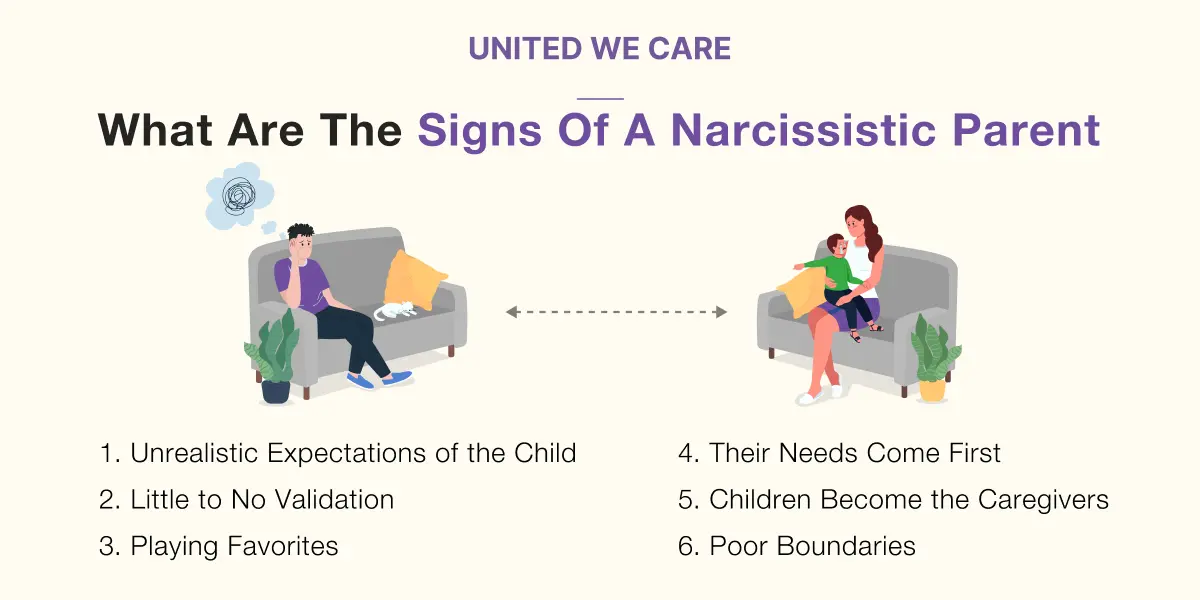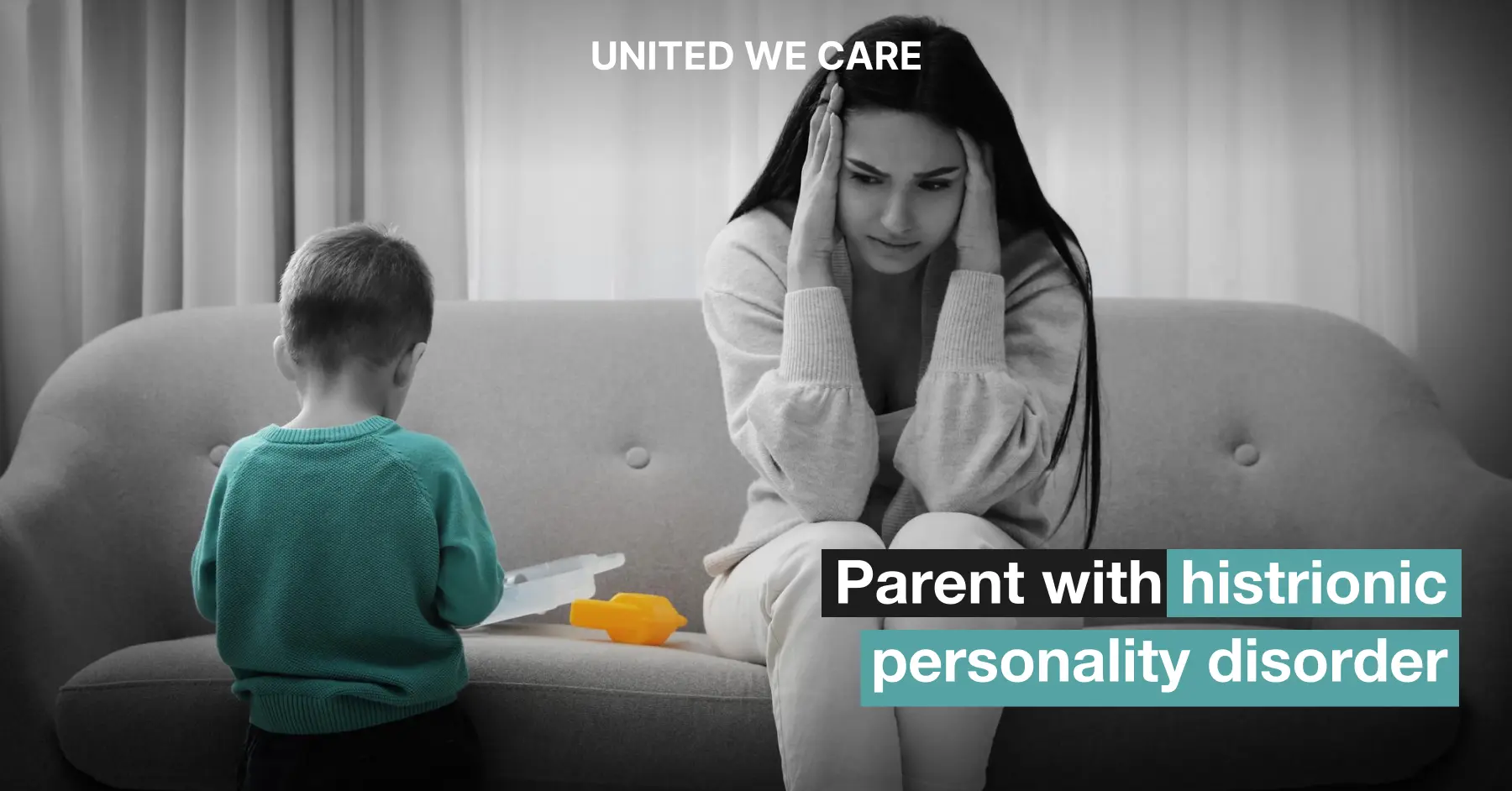Introduction
Having a parent with histrionic personality disorder is a difficult experience. In fact, it can have an enduring and detrimental impact on the child’s mental health. The disorder prevents the parent from prioritizing the child’s needs. Additionally, the parent’s pathological personality shapes the child’s attachment style, emotional intelligence, and coping mechanisms. In this article, we’ll take a closer look at this impact and discuss ways to cope with a parent with histrionic personality disorder.
Symptoms of Parent with Histrionic Personality Disorder
Histrionic personality disorder has a very unique and specific set of symptoms as described by the DSM 5. Check whether your parent shows the following symptoms.

Excessive Need for Attention
One of the characteristic symptoms of histrionic personality disorder is the need to be the center of attention at all times. The parent feels uncomfortable and insecure if attention is drawn towards the children. You might find them do or say inappropriate things to draw and sustain people’s attention to themselves.
Provocative Behavior and Appearance
Often, the attention drawn to the person is through provocative behavior and appearance. The parent may show up to events in improper clothing that is eye-grabbing or grandiose. They may also flirt inappropriately with the child’s teachers, coaches, or other stakeholders.
High Suggestibility
A parent with histrionic personality disorder tends to have high suggestibility. This means that they may rapidly change their opinion about something or take a random person’s advice too seriously. Even if this means causing great inconvenience to their family members, they may insist on taking action on this suggestion.
Impressionistic Speech
You might find a parent with histrionic personality disorder speaking in an impressionistic and vague way. They may express a strong opinion on something without being asked and without any justification. As parents, they may inadvertently cause emotional invalidation and neglect because of this tendency.
Exaggerated Emotions & Speech
On top of all that, a parent with histrionic personality disorder tends to have shifting and shallow emotions. One minute, they may feel a certain way and, within minutes, express the completely opposite emotion. Furthermore, they may also exaggerate their feelings and express them more intensely than appropriate.
Read more – Living With Histrionic Personality Disorder
How to Spot a Parent with Histrionic Personality Disorder
Here are some ways you can try to spot a parent with histrionic personality disorder. Once you familiarize yourself with the symptoms, it becomes easier to connect the dots.
Patterns of Dressing
Is the parent in the habit of dressing inappropriately? Do they wear sexually provocative clothes to occasions where the children are supposed to be the center of attention? Do they purposely try to draw people’s attention to themselves using their appearance? If so, then they are likely to have histrionic personality disorder.
Patterns of Expressing Emotions
Notice if the parent has a pattern of expressing emotions in a loud and exaggerated way. Do they make mountains out of molehills? Do they quickly change their expression without truly feeling the depth of the emotion? If you have noticed anything like that, you could consider the possibility of HPD.
Quality of Interpersonal Relationships
Lastly, you can also examine the quality of the parent’s relationships with other people. Generally, histrionic personality disorder makes the individual perceive relationships as deeper than they actually are. This leaves them vulnerable to manipulation in the context of high suggestibility. They also become easily offended if their perceived level of connection is not reciprocated.
Effects on Kids if a Parent Has Histrionic Personality Disorder
Researchers have reiterated in several publications that having a parent with histrionic personality disorder reflects pervasive dysfunction. These problems are manifested across situational and interpersonal contexts, including the parent-child relationship [1].
This perception is reaffirmed in most literature reviews examining the impact of histrionic personality disorder on parenting. The majority of the findings supported the association between a diagnosis of personality disorder, poor parent-child interactions, and problematic parenting practices. [2]
More information about- histrionic personality disorder
How to cope with a Parent with Histrionic Personality Disorder
Now that we have built an understanding of histrionic personality disorder let’s discuss how to cope if your parent suffers from it.
Don’t Take Things Personally
Firstly, it will help immensely if you can slowly condition yourself not to take your parent’s behavior personally. They may act in various ways that cause you to feel all sorts of unpleasant emotions.
Instead of taking their behavior patterns as triggers, try to remind yourself that your parent has a mental illness. Just because they are in a position of authority in your life doesn’t mean that everything they say or do is right. Build a healthy emotional distance from their patterns.
Establish Clear Boundaries
In order for you to maintain that emotional distance, you need to establish clear boundaries. If there is something that your parent repeatedly does that you find unacceptable, stand up for yourself.
Learn how to communicate assertively in a manner that is firm yet not aggressive. You can also follow violations of your boundaries with appropriate consequences so that your parent registers the need for change.
Create a Network of Support
Remember, dealing with a parent with histrionic personality disorder cannot be done in isolation. You need reliable people in your life who validate and reassure you. After all, your parent’s illness probably prevented them from teaching you how to believe in and look after yourself.
When you invest your resources in your healing journey, the right kind of people will start showing up in your life. Allow yourself to take their help and nourish your meaningful relationships. As a result, you will have built a network of support that will aid you to cope.
Get Professional Help
Finally, it is highly recommended that you seek professional help to guide you in your journey to cope. While individual therapy is an excellent choice, you can also try to convince your parent for family therapy.
This could help the whole unit at home to address the challenges posed by the parent’s personality disorder. Nevertheless, if that is not an option for you, don’t deny yourself the professional support you need.
Conclusion
Clearly, growing up with a parent with histrionic personality disorder is not easy. There are several issues with this personality disorder that compromise on the quality of parenting. The parent’s excessive need for attention, inappropriate behavior, and emotional stuntedness lead to long-lasting problems for the child.
Thankfully, there are things you can do to cope with a parent with histrionic personality disorder. You’ll need to learn not to take things personally, establish healthy boundaries, create a network of support, and get professional help. Talk to our experts at United We Care to learn more!
References
[1] Wilson, S., & Durbin, C. E. (2012). Parental personality disorder symptoms are associated with dysfunctional parent-child interactions during early childhood: A multilevel modeling analysis. Personality Disorders: Theory, Research, and Treatment, 3(1), 55–65. https://doi.org/10.1037/a0024245
[2] Laulik, S., Chou, S., Browne, K.D. and Allam, J., 2013. The link between personality disorder and parenting behaviors: A systematic review. Aggression and Violent Behavior, 18(6), pp.644-655.
[3] Kohlmeier, G.M., 2019. Study of the Impact of Adolescent Perceived Parenting Traits on the Development of Borderline, Narcissistic, and Histrionic Personality Disorders Based on Millon’s Biopsychosocial Theory (Doctoral dissertation, Adler University).





